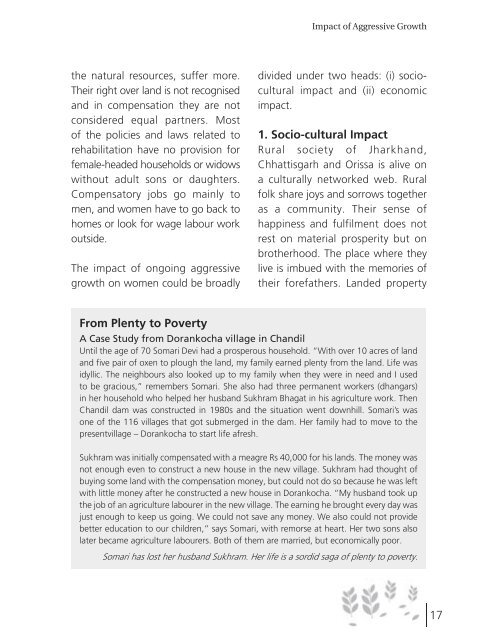om e 's Ali a - Land ss De elo en - Friedrich-Ebert-Stiftung, India Office
om e 's Ali a - Land ss De elo en - Friedrich-Ebert-Stiftung, India Office
om e 's Ali a - Land ss De elo en - Friedrich-Ebert-Stiftung, India Office
You also want an ePaper? Increase the reach of your titles
YUMPU automatically turns print PDFs into web optimized ePapers that Google loves.
the natural resources, suffer more.<br />
Their right over land is not recognised<br />
and in c<strong>om</strong>p<strong>en</strong>sation they are not<br />
considered equal partners. Most<br />
of the policies and laws related to<br />
rehabilitation have no provision for<br />
female-headed households or widows<br />
without adult sons or daughters.<br />
C<strong>om</strong>p<strong>en</strong>satory jobs go mainly to<br />
m<strong>en</strong>, and w<strong>om</strong><strong>en</strong> have to go back to<br />
h<strong>om</strong>es or look for wage labour work<br />
outside.<br />
The impact of ongoing aggre<strong>ss</strong>ive<br />
growth on w<strong>om</strong><strong>en</strong> could be broadly<br />
Impact of Aggre<strong>ss</strong>ive Growth<br />
divided under two heads: (i) sociocultural<br />
impact and (ii) econ<strong>om</strong>ic<br />
impact.<br />
1. Socio-cultural Impact<br />
Rural society of Jharkhand,<br />
Chhattisgarh and Ori<strong>ss</strong>a is alive on<br />
a culturally networked web. Rural<br />
folk share joys and sorrows together<br />
as a c<strong>om</strong>munity. Their s<strong>en</strong>se of<br />
happine<strong>ss</strong> and fulfilm<strong>en</strong>t does not<br />
rest on material prosperity but on<br />
brotherhood. The place where they<br />
live is imbued with the memories of<br />
their forefathers. <strong>Land</strong>ed property<br />
Fr<strong>om</strong> Pl<strong>en</strong>ty to Poverty<br />
A Case Study fr<strong>om</strong> Dorankocha village in Chandil<br />
Until the age of 70 S<strong>om</strong>ari <strong>De</strong>vi had a prosperous household. “With over 10 acres of land<br />
and five pair of ox<strong>en</strong> to plough the land, my family earned pl<strong>en</strong>ty fr<strong>om</strong> the land. Life was<br />
idyllic. The neighbours also looked up to my family wh<strong>en</strong> they were in need and I used<br />
to be gracious,” remembers S<strong>om</strong>ari. She also had three perman<strong>en</strong>t workers (dhangars)<br />
in her household who helped her husband Sukhram Bhagat in his agriculture work. Th<strong>en</strong><br />
Chandil dam was constructed in 1980s and the situation w<strong>en</strong>t downhill. S<strong>om</strong>ari’s was<br />
one of the 116 villages that got submerged in the dam. Her family had to move to the<br />
pres<strong>en</strong>tvillage – Dorankocha to start life afresh.<br />
Sukhram was initially c<strong>om</strong>p<strong>en</strong>sated with a meagre Rs 40,000 for his lands. The money was<br />
not <strong>en</strong>ough ev<strong>en</strong> to construct a new house in the new village. Sukhram had thought of<br />
buying s<strong>om</strong>e land with the c<strong>om</strong>p<strong>en</strong>sation money, but could not do so because he was left<br />
with little money after he constructed a new house in Dorankocha. “My husband took up<br />
the job of an agriculture labourer in the new village. The earning he brought every day was<br />
just <strong>en</strong>ough to keep us going. We could not save any money. We also could not provide<br />
better education to our childr<strong>en</strong>,” says S<strong>om</strong>ari, with remorse at heart. Her two sons also<br />
later became agriculture labourers. Both of them are married, but econ<strong>om</strong>ically poor.<br />
S<strong>om</strong>ari has lost her husband Sukhram. Her life is a sordid saga of pl<strong>en</strong>ty to poverty.<br />
17


